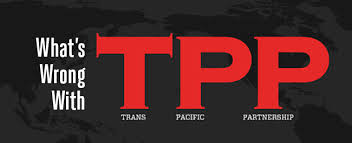The U.S. is at the tail end of negotiating the Trans-Pacific Partnership (TPP)—a massive trade deal with Mexico, Canada, Japan, Vietnam and seven other countries. The negotiations have been conducted in secret. Now Congress will soon decide whether to grant the Obama administration “fast track” authority to have the “final” pact approved as is—meaning strict limits on Congressional debate and no amendments. That’s a terrible idea for lots of reasons—not least of which is that the TPP could sabotage the ability of the U.S. (and other nations) to respond to the climate crisis.
Senator Elizabeth Warren put her finger on the problem in an op-ed for the Washington Post “Who will benefit from the TPP? American workers? Consumers? Small businesses? Taxpayers? Or the biggest multinational corporations in the world?” Here’s a hint: The answer is definitely not “all of the above.”
Multinational corporations—including some of the planet’s biggest polluters—could use the TPP to sue governments, in private trade tribunals, over laws and policies that they claimed would reduce their profits. The implications of this are profound: Corporate profits are more important than protections for clean air, clean water, climate stability, workers’ rights and more.

